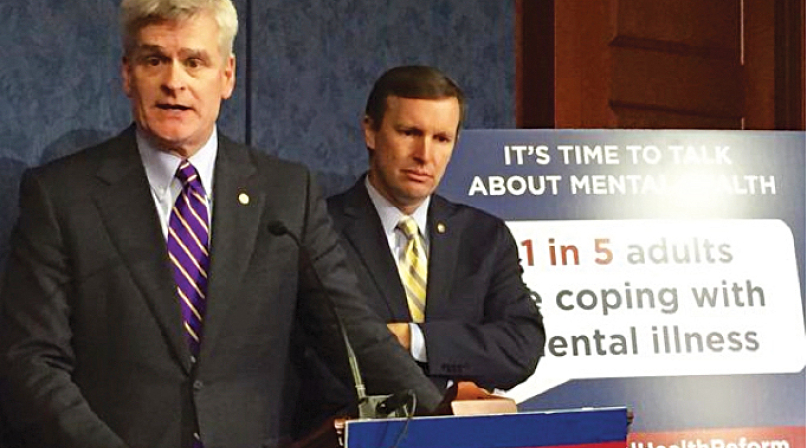Share
Line: | @NACoTweets: Mental health reform makes way through Congress http://bit.ly/1LZD7nO |
Immediately before Congress adjourned for its August recess, two major bills that address mental health issues were introduced in the Senate — adding to a number of bills previously introduced in both chambers — as mental health reform again takes center stage in response to recent violent events.
The deadly 2012 school shootings in Newtown, Conn. first sparked renewed legislative interest in behavioral health, but comprehensive reform efforts failed to advance in the 113th Congress. Advocates are hoping 2015 is the year for mental health reform, with Rep. Fred Upton (R-Mich.), chairman of the House Energy and Commerce Committee, vowing to make it a priority.
Such initiatives could greatly affect counties’ essential role in providing behavioral health care to more than 43 million Americans through 750 county behavioral health authorities. In addition, they could support efforts like the Stepping Up Initiative to decrease the number of individuals with mental and co-occurring substance abuse disorders in more than 3,000 local jails.
On Aug. 5, Sen. Chris Murphy (D-Conn.) and Sen. Bill Cassidy (R-La.) introduced the Mental Health Reform Act (S. 1945) intended to make critical reforms to the mental health system. The measure is being touted as a companion bill to H.R. 2646, the Helping Families in Mental Health Crisis Act, introduced in June by Reps. Tim Murphy (R-Pa.) and Eddie Bernice Johnson (D-Texas).
Both bills would create a new assistant secretary for mental health and substance abuse position at the Department of Health and Human Services to coordinate policy and administer grants. Both bills would also partially ease the Institution for Mental Diseases (IMD) exclusion by allowing Medicaid to cover care in a free-standing psychiatric facility if the facility has an average stay of fewer than 30 days.
IMDs are inpatient facilities treating, in general, people with severe mental illness. Federal Medicaid matching payments are prohibited for IMDs with a population between the ages of 22 and 64.
NACo policy supports amending the IMD exclusion to allow non-hospital residential placements of up to 90 days of care per year and up to 15 days per year for hospital-based mental health and substance use care. Easing the IMD exclusion would allow counties to provide much needed inpatient and residential psychiatric services to their residents.
Differences Mark Bills
S. 1945 and H.R. 2646 also have important differences. The House bill would provide incentives to states that implement assisted outpatient treatment (AOT) programs, now permitted in 45 states. The Senate version does not.
AOT is court-ordered treatment (including medication) for individuals with severe mental illness who meet strict legal criteria such as having a history of medication noncompliance.
A provision to make Medicaid financial incentives available to mental health providers for the use of electronic health records, which NACo supports, is only included in the House version, which would grant caregivers access to health care information on seriously mentally ill patients under certain conditions.
The Senate bill simply clarifies existing guidance around the Health Insurance Portability and Accountability Act (HIPAA) and states that individuals should be given advanced notice of any decision to share their information with family members or caregivers.
NACo policy calls for amending language in HIPAA to clarify providers may disclose concerns about a patient’s safety to appropriate parties when they believe in “good faith” that there is a threat of “serious or imminent” danger to the patient or others.
Mental Illness and Jails
Also on Aug. 5, Sen. John Cornyn (R-Texas) introduced the Mental Health and Safe Communities Act (S. 2002) intended to prevent the unnecessary incarceration of people with mental illness and enhance treatment for individuals with mental illness while incarcerated and following their release.
The bill reauthorizes and expands the Mentally Ill Offender Treatment and Crime Reduction Act (MIOTCRA) and its Justice and Mental Health Collaboration Program (JMHCP). MIOTCRA was first enacted by Congress in 2004. It authorized $50 million in grants to be administered by the Department of Justice to state, tribal and local governments to develop programs designed to improve outcomes for individuals with mental illness in the criminal justice system. However, congressional appropriations have never fully funded the program, and the $8.5 million currently authorized is set to expire at the end of September.
JMHCP helps states and counties design collaborative efforts between criminal justice and mental health systems by specifying that federal funding should be used to expand programs such as pre-trial screening and jail diversion programs, mental health courts and veterans treatment courts.
In April, Sen. Al Franken (D-Minn.) and Rep. Doug Collins (R-Ga.) introduced the Comprehensive Justice and Mental Health Act (CJMHA) in their respective chambers, which would also reauthorize MIOTCRA. NACo supports legislation that reauthorizes MIOTCRA and builds upon its success.
Cornyn’s bill, however, goes beyond the justice and mental health act by also amending the National Criminal Background Check System. The bill would clarify the scope of mental health records to be reported and provide financial incentives for states to share these records. States are not now required to share these records, and some argue this has allowed people to have guns that could have otherwise been identified by background checks.
The bill would also change terminology in the Gun Control Act of 1968 from “persons adjudicated as mentally defective” to “persons adjudicated as incompetent” and clarifies that adjudication requires due process protections. NACo policy supports provisions of the act, which are directed at preventing possession of handguns by proscribed groups of people, including persons committed to a mental institution.
Sponsors Optimistic Despite Busy Schedule
Lawmakers are hoping that these bills will be more successful than previous attempts, but they will be up against multiple priorities in a narrow window of time. When Congress returns this week, it will need to vote on the Iran nuclear agreement and advance appropriations legislation for the next fiscal year before Oct. 1— in the course of a month that will feature an historic congressional address from Pope Francis, as well as breaks for Labor Day and Jewish holidays.
In October, Congress will also need to replenish the Highway Trust Fund and address the debt ceiling. Nonetheless, lawmakers are optimistic that these bills can proceed to markups in their respective committees of jurisdiction and bipartisan consensus can be reached around mental health reform before next year when presidential election politics will make it more challenging.



